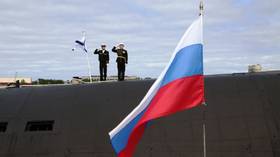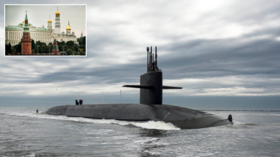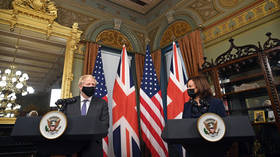Plenty more subs in the sea: AUKUS nuclear deal could end up pushing Russia and China closer together but dividing Europe

Moscow’s power, often denigrated and exaggerated at the same time in the characteristically contradictory style of its Western opponents, is not comparable to that of the war-addicted post-Cold War USA, but it is enough to matter. From Central Europe to the Sea of Japan, the country has regional security interests spanning half the globe.
It is no surprise, then, that the newly forged Atlantic-Pacific triple alliance between the US, Great Britain, and Australia, known as AUKUS, has caught the eye of Russian leaders and defense chiefs. Announced on 15 September, the pact was presented as targeting China. However, it’s clear its geopolitical implications won’t be felt in Beijing alone.
Initially cautious, Moscow’s response has quickly become more critical. Nikolai Patrushev, secretary of Russia’s National Security Council, has denounced AUKUS as the “prototype of an Asian NATO,” set to expand, and directed against both China and Russia.
The essence of AUKUS is not complicated. While it covers various areas, such as cyber and artificial intelligence, its core is the transfer of technology from the USA to Australia. And not just any technology, but that of nuclear-powered submarines, which, until now, have been in the possession of only six states: China, France, Great Britain, Russia, the USA, and – in a complicated manner dependent on Russia – India.
While having submarines propelled by nuclear reactors is, fortunately, not the same as having nuclear weapons to launch from them, this technology is still of great strategic significance. The US Naval Institute has summed up its advantages (even while acknowledging its costs): “Superior speed, range, stealth, and endurance make the nuclear submarine a very effective offensive weapon, capable of projecting power and taking the fight to the enemy.”
There is no doubt, then, that AUKUS adds to Australia’s military clout and, indirectly, to that of the US as well. It also increases, for now at least, its political weight in Washington, where President Joe Biden has declared Canberra to be an ally second to none (officially making the “special relationship” with Britain a merry threesome, it seems). Yet, with Australia arming itself most of all against China, why and how is AUKUS important to Russia?
There are, in essence, three ways in which AUKUS could make a difference for Russia: through its effects on Russia, on China (or Asia more broadly), and on the EU. With respect to China and Russia, Australia’s future nuclear-propelled subs would have enough range to enter the northern Pacific waters where Russia’s navy is routinely stationed. If these boats were equipped with weapons that could strike Russia, which is technically feasible, they would become a much more serious concern. Moscow may, accordingly, expand its own nuclear submarine fleet in the Pacific. In such a world, the already existing strategic partnership between China and Russia would only get stronger.
ALSO ON RT.COMBiden is hosting a Quad summit to counter the influence of Beijing. How might China respond to being left out in the cold?Especially in combination with the already existing Quadrilateral Security Dialogue (Quad) between the United States, Japan, India, and Australia, as well as the Five Eyes intelligence cooperation between Australia, Canada, New Zealand, Great Britain, and the United States, AUKUS may end up doing what alliances, even ostentatiously defensive ones, often do: spur the emergence of counter-alliances.
As for now, however, Russia has sent signals of caution – it is clearly not in the mood to let the AUKUS fall-out contaminate long-cultivated partnerships and relationships of growing importance. That is the key message of a recent statement by the special envoy of the Russian president for Shanghai Cooperation Organization (SCO) Affairs Bakhtiyor Khakimov. Moscow, Khakimov was careful to underline, does not seek to pit the SCO against AUKUS.
Exercising this kind of restraint with respect to the SCO is prudent. For one thing, Russia would by no means necessarily get its way if it tried to take a more aggressive line at this point. All it might achieve is to permit AUKUS to create tensions in the SCO. Moreover, while AUKUS, unfortunately, offers hope to those in the West who want to wage a second Cold War, this time against China, its most important component – namely, the US nuclear subs for Australia – will take more than a decade to actually be delivered. Moscow has reason to be concerned but not to overreact. In fact, doing so would only be grist for the mill of the Cold War re-enactors in the West.
This does not mean that Russia will not exact a price or seek its own advantage, as states do: one obvious way in which it could profit from AUKUS is to treat it as a precedent to share its own nuclear-submarine technology more widely, with countries in Asia and beyond. Last but not least, Russia may also look for ways to exploit the discontent of states, such as Indonesia and Malaysia, to strengthen its bilateral ties and security arrangements. It is by no means only China that is unhappy with AUKUS.
What about the EU then? After all, if there is one country even angrier than China, it’s France. In one of the curious self-defeating performances we have come to expect from US diplomacy, the making of a new alliance in the Pacific has come with maximum injury and offense to America’s oldest ally in Europe. France was kicked out of its own submarine deal with Australia with a brutality usually reserved for small states in the Middle East (except Israel and Saudi Arabia, of course).
There are ironic effects too: The spokeswoman of Russia’s Ministry of Foreign Affairs, Maria Zakharova, could not resist a little Schadenfreude, reminding France of the manner in which it canceled a deal over advanced Mistral landing ships with Russia in 2015. At least one Western commentator, speaking on France 24, of all places, has compared France’s reaction to that of Russia and “how it lashes out when it feels boxed in by the West.” So, that’s how it feels – some French politicians might now say to themselves – when your well-founded concerns are dismissed with a dose of patronizing ‘national-character’ pop psychology.
Could this affront to France – bad enough to make it recall its ambassadors to Washington and Canberra, with heated rhetoric about a “stab in the back” – somehow translate into a general chill between the EU and the US? No. Despite claims to the contrary, the European Union is decidedly not rallying around France.
In reality, there are clear, unsurprising signals that the EU as a whole is not willing to seriously confront the US just because of Paris’ humiliation. The latter’s attempt to get the rest of the EU to merely postpone an important meeting with the US on building a technology alliance against China, officially called the EU-US Trade and Technology Council, or TTC, has failed to carry the day in Brussels.
When it comes to hard, strategic issues of trade, technology transfer, regulation, and, of course, ultimately a lot of money, the EU’s actions are in line with the warning of Norbert Röttgen, a German conservative politician influential on matters of foreign policy: For him, the US is now ready to cooperate but not to wait.
ALSO ON RT.COMAsia-Pacific doesn’t need ‘submarines and gunpowder’ from AUKUS pact, Chinese Foreign Ministry saysThere simply is no general West European desire to annoy the US on behalf of France. Inevitably, the EU’s top diplomat Josep Borrell has offered words, first of solidarity with France, then of mild admonition toward the US, Great Britain, and Australia, reminding them of the obvious truism that partnership usually means cooperation and coordination. But the EU’s response to the US will not go further than that. If anyone in Paris really had hopes that it would, they were naïve.
It is true that, under Macron, France is the key proponent of “strategic autonomy” for Europe – that is, in essence, the simple idea that a part of the world so wealthy, populous, and advanced should be able to defend itself. That’s really the core of it. But in Western Europe, where the Atlanticist fallacy of mistaking cooperation with the US for a need to be vitally dependent on it is well entrenched in careers, think tanks, general conformism, and skimpy defense budgets, that is not a consensus position.
Not even after the brutal “America first” policies of Donald Trump. And not even after the way AUKUS was launched. It has just made it crystal clear that these policies are still in place, if with an extra dash of incompetence and some fuzzy words by the likes of Antony Blinken. Any Russian hopes that the humiliation of France will drive a wedge between the US and the EU are likely to be disappointed: The EU is neither smart nor united enough for that to happen. AUKUS, it turns out, is both a problem and an opportunity for Russia – in Asia. But not in Europe.








/https://www.niagarafallsreview.ca/content/dam/thestar/news/canada/2021/09/25/huawei-executive-meng-wanzhou-receives-warm-welcome-upon-return-to-china/_1_meng_wanzhou_2.jpg)













No comments:
Post a Comment
Note: Only a member of this blog may post a comment.